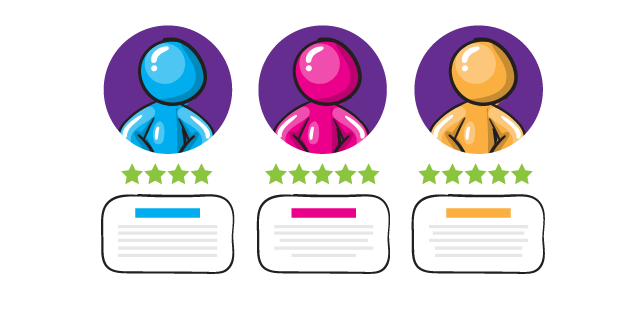
One way businesses are doing just that is by using social proof. It’s all well and good driving traffic to your website, but you want visitors to stay there and have a good look around! For this outcome, you need to understand what social proof is and how it can be used as part of your marketing.
What is Social Proof?
“Social Proof is a psychological phenomenon where people conform to the actions of others under the assumption that those actions are reflective of the correct behavior.”
Social proof is a tactic used by businesses worldwide to increase conversions by putting the customer at ease, knowing other people have used the same services or bought the same products.
The Result:
Nearly 70% of people look at a product review before taking the plunge and purchasing.
Online reviews are 12 times more trusted than product descriptions and reviews can increase sales by 18%
When you think about it, social proof is all around us. For example, ‘McDonald’s Billions and Billions served’ surely it must be good if they’ve served that many? How about when you walk past restaurants, chances are you’ll go into one that looks busy rather than an empty restaurant, because the busy one must be better, right? Celebrity endorsements, if it’s good enough for them, it’s good enough for you.
How can you use social proof on your website?
1. Customer Testimonials
Probably the easiest form of social proof to implement is a customer testimonial. 88% of people trust online testimonials just as much as a personal recommendation. Customer testimonials can be displayed on your website in a number of ways, perhaps simple quotes that are dotted throughout your site (make sure you use a photo of the customer where possible) a video testimonial is also a great platform and will help build trust.

2. Case Studies
Case studies and portfolios are more detailed and will help customers looking at a specific service or product. People love success stories, if you can do it for one company the customer will be believe you can do the same for them. Case studies are high in authority and can be considered as more reputable.
3. Customer Base
Using client logos is an effective form of social proof. Showing potential customers your existing customer base is basically showing them it’s good enough for successful businesses to use, it’s good enough for them.
It’s always a good idea to use high profile customers, or if you provide to a niche market, using well-known companies in your industry of expertise.

4. Trust and Certification Badges
If you belong to any associations of have certifications or accreditations, make your website wear them like a badges of honour.
They demonstrate that you are a force to be reckoned with and you know your stuff! Studies have shown that trust and accreditation badges can improve conversions by 30%

5. Product Reviews
If you are looking at a new product or service online that you’ve never heard of, you’ll probably want to see what others are saying about it. Customer reviews are a fantastic way to increase your conversions.
Make sure the reviews are authentic, showing both positive and negative reviews will build trust.
Perhaps one of the best things about using social proof in your marketing strategy is that it’s pretty simple to implement. If you don’t have any testimonials or reviews, get in touch with some of your customers and ask them! It’s worth testing different techniques to see what makes your website convert better.
Get a free copy of our marketing tips guide, it has over 30 techniques you can use!
Real Growth. Real Impact.
HubSpot Website Design Impact Award WINNER: Custom-built but easy to manage: a HubSpot CMS case study
How much does a new website cost? 5 ways to make your investment worth it
HubSpot vs. WordPress vs. Drupal
GDD 101: How to Impact Score Your Wishlist Effectively
Why You Should be Using Hotjar for Growth Driven Design
How to Create a Sitemap for Inbound Success
What do the First 6 Months of Growth Driven Design Look Like?
See why enterprises choose Avidly
Let’s build your HubSpot success story
Compelling final call to action - with accompanying link to Contact page








